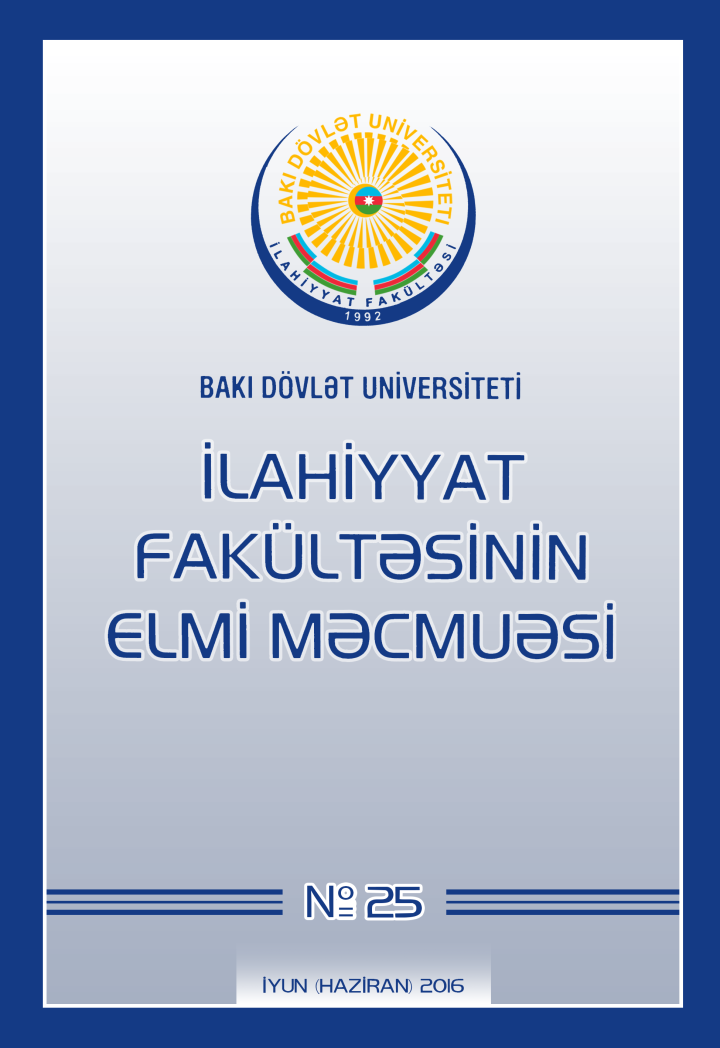Spinozanın fəlsəfi sistemində “conatus” problemi
The Problem of “Conatus” in the Philosophy of Spinoza
Проблема “конатуса” в философской системе спинозы
Benardete Jose. “Therapeutics and Hermeneutics”. In Spinoza: Issues and Directions. Edited by: Edwin Curley and Pierre-François Moreau. Leiden: “E.J. Brill”, 1990, pp. 209–220.
Broad Charlie Dunbar. Five Types of Ethical Theory. London: “Routledge & K. Paul”, 1967.
Cook J.Thomas. Spinoza’s Ethics: A Reader’s Guide. London: “Continuum”, 2007.
Curley Edwin. A Spinoza Reader: The Ethics and Other Works. Princeto: “Princeton University Press”, 1994.
Curley Edwin. Behind the Geometrical Method. Princeton: “Princeton University Press”, 1988.
Damasio Antonio. Looking for Spinoza: Joy, sorrow, and the feeling brain. Orlando: “Harcourt, Inc”, 2003.
Deleuze Gilles. Expressionism in Philosophy: Spinoza. Translator: Martin Joughin. New York: “Zone Books”, 1990.
Dijn Herman de. Spinoza: The Way to Wisdom. West Lafayette: “Purdue University Press”, 1996.
Garrett Aaron. Meaning in Spinoza’s Method. Cambridge: “Cambridge University Press”, 2003.
Garrett Don. “Introduction”. In The Cambridge Companion to Spinoza. Edited by: Don Garrett. Cambridge: “Cambridge University Press”, 1996, pp. 1–12.
Hampshire Stuart. “Truth and Correspondence in Spinoza”. In Spinoza on Knowledge and the Human Mind. Edited by: Y.Yovel. Leiden: “Brill”, 1994, pp. 1–10.
Jarrett Charles. Spinoza: A Guide for the Perplexed. London/New York: “Continuum Publishing”, 2007.
Kisner Matthew J. Spinoza on Human Freedom: Reason, Autonomy and the Good Life. Cambridge: “Cambridge University Press”, 2011.
Le Buffe Michael. From Bondage to Freedom: Spinoza on Human Excellence. Oxford: “Oxford University Press”, 2010.
Lermond Lucia. The Form of Man: Human Essence in Spinoza’s Ethic. Leiden: “E.J. Brill”, 1988.
Mason Richard. The God of Spinoza. Cambridge: “Cambridge University Press”, 1997.
Miller Jon. Spinoza and the Stoics. Cambridge: “Cambridge University Press”, 2015.
Montag Warren. Bodies, Masses, Power: Spinoza and His Contemporaries. London/New York: “Verso”, 1999.
Roth Leon. Spinoza. London: “Ernest Benn Limited”, 1929.
Shirley Samuel. Spinoza: Complete Works. Indianapolis: “Hackett Publishing Company Inc”, 2002.
Smith Steven B. Spinoza’s Book of Life: Freedom and Redemption in the Ethics. New Haven: “Yale University Press”, 2003.
Steinberg Diane. On Spinoza. Wadsworth: “Thomson Learning, Inc”, 2000.
Downloads
Article Information
- Article Type Articles
- Submitted June 30, 2016
- Published June 30, 2016
- Issue № 25(25) June 2016
- Section Articles
